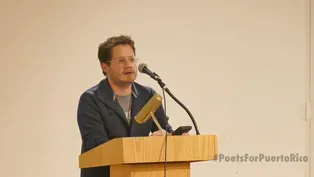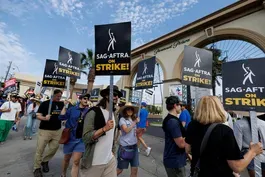
Slow pace of Ukraine's counteroffensive prompts questions
Clip: 7/18/2023 | 12m 24sVideo has Closed Captions
Slow pace of Ukraine's counteroffensive prompts military strategy questions
U.S. Joint Chiefs chairman Gen. Mark Milley described Ukraine's effort to retake territory in the east and south as a tough and difficult fight. Forces have been slowed by minefields and intense Russian resistance. To learn more about the offensive and its prospects for success, William Brangham spoke with retired Army Col. Gary Espinas and Kimberly Kagan of the Institute for the Study of War.
Problems with Closed Captions? Closed Captioning Feedback
Problems with Closed Captions? Closed Captioning Feedback
Major corporate funding for the PBS News Hour is provided by BDO, BNSF, Consumer Cellular, American Cruise Lines, and Raymond James. Funding for the PBS NewsHour Weekend is provided by...

Slow pace of Ukraine's counteroffensive prompts questions
Clip: 7/18/2023 | 12m 24sVideo has Closed Captions
U.S. Joint Chiefs chairman Gen. Mark Milley described Ukraine's effort to retake territory in the east and south as a tough and difficult fight. Forces have been slowed by minefields and intense Russian resistance. To learn more about the offensive and its prospects for success, William Brangham spoke with retired Army Col. Gary Espinas and Kimberly Kagan of the Institute for the Study of War.
Problems with Closed Captions? Closed Captioning Feedback
How to Watch PBS News Hour
PBS News Hour is available to stream on pbs.org and the free PBS App, available on iPhone, Apple TV, Android TV, Android smartphones, Amazon Fire TV, Amazon Fire Tablet, Roku, Samsung Smart TV, and Vizio.
Providing Support for PBS.org
Learn Moreabout PBS online sponsorshipGEOFF BENNETT: A tough and difficult fight, that's how the chairman of the Joint Chiefs, General Mark Milley, today described Ukraine's effort to retake territory in the east and south.
As William Brangham explains, Ukrainian forces have been slowed by minefields and intense Russian resistance.
WILLIAM BRANGHAM: Raining from the sky onto Ukrainian ports is what the Russians call revenge.
MAJ. GEN. IGOR KONASHENKOV, Russian Ministry of Defense (through translator): The Russian armed forces delivered a group strike of retribution at facilities where terrorist acts against the Russian Federation were being prepared.
WILLIAM BRANGHAM: But Ukraine claims its air defense teams shot down almost all the Russian missiles and drones.
Falling debris did damage some port facilities and people's homes.
In the port city of Odessa, Ukrainian police helped rescue an elderly man injured and trapped underneath rubble.
Russia says they are exacting revenge for the alleged Ukrainian attack on a key bridge that links Russia to annexed Crimea.
And it came a day after Russia suspended a deal that allowed Ukraine to ship vital grain supplies from Odessa to the rest of the world.
Meanwhile, the much larger pushback against Russia's invasion continues with intense fighting along the eastern and southern fronts, as Ukraine tries to retake land occupied by Russia.
Five weeks into its counteroffensive, Ukraine claims to have liberated several villages, including in the east and southeast, but, so far, the gains have been small.
One estimate says that along the 930-mile-long front line, Ukraine has only recaptured about 98 square miles of land.
In an interview on Russian TV yesterday, President Vladimir Putin said Ukraine's advance is failing.
VLADIMIR PUTIN, Russian President (through translator): All attempts by the enemy to break through our defenses have not been successful for the entire time of the offensive.
WILLIAM BRANGHAM: And days before, President Zelenskyy acknowledged that Russian resistance was intense.
VOLODYMYR ZELENSKYY, Ukrainian President (through translator): We all need to understand very clearly that Russian forces on our southern and eastern lands are doing everything they can to stop our soldiers.
Everyone who repels enemy attacks, well done.
I am grateful to every one of our soldiers.
WILLIAM BRANGHAM: Ukrainian soldiers are facing deeply dug-in Russian forces who have constructed and fortified hard-to-overcome obstacles, including these so called dragon teeth barricades and miles of concentrated minefields that Ukraine is painstakingly trying to remove.
Ukraine is asking for more U.S.-made tools for this job such as mine-clearing line charges, or MCLCs, and Bangalore explosives, which are used to detonate them.
GEN. MARK MILLEY, Chairman, Joint Chiefs of Staff: The casualties that the Ukrainians are suffering on this offensive are not so much from Russian airpower.
They are from minefields.
That's what the coalition is trying to provide them, additional mine-clearing MCLCs, line charges, Bangalores, that sort of thing, in order to continue to work their way through the minefields.
So, I'm confident that they can do this.
WILLIAM BRANGHAM: Last week, the U.S. also started sending the Ukrainians cluster munitions, controversial weapons that can rain down multiple smaller bomblets over a wide area.
But the U.S. has thus far not agreed to give Ukraine long-range missiles like those that France and Britain are already supplying.
So, while the debate in the West continues over how best to help the Ukrainians in their fight, the Ukrainian soldiers on the front lines have to make do with what they have today.
SOLDIER (through translator): We shot at enemy positions so they don't accumulate their forces and think about doing something evil.
We try to destroy as many enemies as we can.
WILLIAM BRANGHAM: So, for more on the Ukrainian offensive and its prospects for success, we get two views.
Retired Colonel Gary Espinas spent 26 years in the Army focused on field artillery, and he was director for Russia and the Black Sea in the office of the secretary of defense.
He's now a professor at the Naval Academy.
And Kimberly Kagan is the founder and president of the Institute for the Study of War, which is nonprofit, nonpartisan research organization.
Thank you to you both for being here.
Gary Espinas, to you first.
We are several weeks, as we have been reporting, into Ukraine's counteroffensive.
How would you assess that that effort is going?
COL. GARY ESPINAS (RET.
), Former U.S. Army Foreign Area Officer: Well, I think it's clear that there has been a slowdown in the counteroffensive, but that shouldn't be a surprise, I think, to anyone.
I mean, look, this is a nation at war.
And wars are characterized by tactical advances and defeats.
And you throw in there a whole lot of uncertainty, something that the Prussian military theorist Carl von Clausewitz called the fog of war.
And so it's not only the Ukrainians that have been preparing for the camera offensive, but the Russians have been preparing for that as well.
And so they have had several months to dig in.
They're highly entrenched.
You have got this 900-mile battle line at the front there.
And in some cases, you have got minefields that are going back 10 kilometers or more.
And so this is what the Ukrainians are having to contend with.
So it's no surprise, I think, certainly to the Ukrainians, nor to any of us who have been watching this, that we're not probably -- given the circumstances that the Ukrainians are faced with, probably not going to see, at least in the near term, a decisive penetration, a decisive victory.
This is not going to be a D-Day kind of penetration, in my opinion, anytime soon.
WILLIAM BRANGHAM: And, Kimberly Kagan, the same question to you.
How do you characterize how the counteroffensive is going?
KIMBERLY KAGAN, President, Institute for the Study of War: Gary characterized this very well.
The Ukrainians began their counteroffensive only five weeks ago.
They have been making adjustments and how they execute their tactics in order to adjust to the minefields and the Russian defenses of their prepared positions.
And the Ukrainians are probing along the line to find weak spots in those Russian defenses.
What we're observing is that the Ukrainians are probing along the south, and they are also probing in the east around the flanks of Bakhmut.
And in the east, where the Russians do not have dug-in, prepared defensive positions right behind them, the Ukrainians are making gates.
WILLIAM BRANGHAM: And, Gary, help us understand that -- the strategy that Kimberly is describing there.
Is the idea that the Ukrainians keep probing to try to find a weakness and then punch through that and send troops into that opening?
Is that the plan here?
COL. GARY ESPINAS: The Ukrainians are having to walk a very fine line between minimizing their losses and then exploiting the vulnerability and -- to their advantage, of course.
Of course, there are limitations, given their current operation, and having to contend with minefields and dug in Russia and enemy troops.
So that really limits their freedom of maneuver.
And so that's the challenge, I think, that they're being faced with right now.
WILLIAM BRANGHAM: And, Kimberly, the -- you both have mentioned the difficulty that the Ukrainians are having with these minefields, which we have seen reporting of, are incredibly concentrated, enormous amounts of mines across the battlefield.
We heard Milley talks about this as being a very difficult issue for them as well.
Do you think the U.S. and the West ought to be doing more to speed the mine-clearing equipment to the Ukrainians?
KIMBERLY KAGAN: Yes, I do.
The West should be equipping the Ukrainians to make as many decisive gains as they can.
And the mine-clearing equipment that the United States is providing will materially affect whether the Ukrainians can actually move forward, punch through, and create a very serious dilemma for the Russians in that line.
WILLIAM BRANGHAM: Gary Espinas, we have talked a lot during this invasion of some weapons, some development being a -- quote, unquote -- "game-changer" for the Ukrainians.
Do you think that there is something that the West could realistically provide to the Ukrainians that would be that?
Is there something that they need that we could get to them that would make a big difference?
COL. GARY ESPINAS: I'm very skeptical about the term game-changer.
There's no kind of magic pill that's going to win the war overnight for Ukraine.
I think the approach that the United States and the West have taken is the right one.
And it's, we are kind of step by step day by day assessing how we can best support the Ukrainians.
And I think that's what we have been doing.
I think that's the more sensible approach.
And I think we should also be very clear that, as I said, there's no magic bullet, no one key weapon system.
At the end of the day, what really counts, I think, are the intangibles.
And when we talk about the Ukrainians' morale and motivation, that, I think, means a lot more than anything, at the end of the day.
And, in fact, what we can provide in terms of security assistance are those kinds of key enablers.
But, at the end of the day, it's the Ukrainians who are going to get themselves across the finish line.
And we're positioned, I think, well, to support that.
WILLIAM BRANGHAM: Kimberly, if the Americans were doing this, or a similarly well-equipped force, they wouldn't be trying to put troops directly on the front line, right?
They would be doing weeks of bombing behind the Russian front lines before they activated this way; isn't that right?
KIMBERLY KAGAN: Yes, it is.
The United States would also have, with it, close air support and attack helicopters to help make it easier for our ground troops to advance.
And the United States also has air assault troops who can actually come in behind the lines and help meet up with troops that are advancing.
So Ukraine does not have any of this.
And the United States, therefore, needs to be patient with the amount of time that it is taking for Ukrainians to make advances, and recognize that it is important to compare the Ukrainians to their capabilities and to the Russians, not to the United States of America.
WILLIAM BRANGHAM: I mean, Gary, given what Kimberly is saying, are we potentially asking too much of the Ukrainians to fight a ground war in a way very differently than we would?
COL. GARY ESPINAS: No, I don't.
I think the Ukrainians are certainly in a different position from the United States.
And I completely agree with Kimberly that the United States has the kind of combat power that the Ukrainians do not have.
An advantage that the Ukrainians do have, however, specifically over the Russians, is, look, they have been in the process of military and defense reform even well before this current war.
It's an effort that the United States, that Great Britain and Canada, as well as other European partners, have been involved with since back to 2014.
And I think we're seeing, despite their relative weakness, I guess you could say vis-a-vis combat power, they're able to make up for that with some kind of initiative and the kind of training that's now being brought to bear that we are not seeing from the Russian side that is completely inept, led by poor leadership and they're poorly trained.
So I think, at the end of the day, what the Ukrainians lack, they will make up for in their cunning.
WILLIAM BRANGHAM: All right, Gary Espinas and Kimberly Kagan, thank you both so much.
KIMBERLY KAGAN: Thank you.
COL. GARY ESPINAS: Thank you.
American Academy of Poets head on bringing poetry to people
Video has Closed Captions
Clip: 7/18/2023 | 5m 53s | First Latino head of American Academy of Poets on bringing poetry to more people (5m 53s)
Despite owning river water rights, tribes largely cut off
Video has Closed Captions
Clip: 7/18/2023 | 9m 27s | Despite owning rights to Colorado River, tribes largely cut off from accessing water (9m 27s)
Fran Drescher on actors’ strike and future of Hollywood
Video has Closed Captions
Clip: 7/18/2023 | 8m | Actors' union president Fran Drescher discusses ongoing strike and future of Hollywood (8m)
Trump says he's target in 2020 election investigation
Video has Closed Captions
Clip: 7/18/2023 | 6m 26s | Trump says he's target in investigation into efforts to overturn 2020 election (6m 26s)
U.S. women's team prepares to defend World Cup title
Video has Closed Captions
Clip: 7/18/2023 | 6m 52s | U.S. Women's National Soccer Team on preparing for a competitive World Cup tournament (6m 52s)
Providing Support for PBS.org
Learn Moreabout PBS online sponsorshipSupport for PBS provided by:
Major corporate funding for the PBS News Hour is provided by BDO, BNSF, Consumer Cellular, American Cruise Lines, and Raymond James. Funding for the PBS NewsHour Weekend is provided by...
















